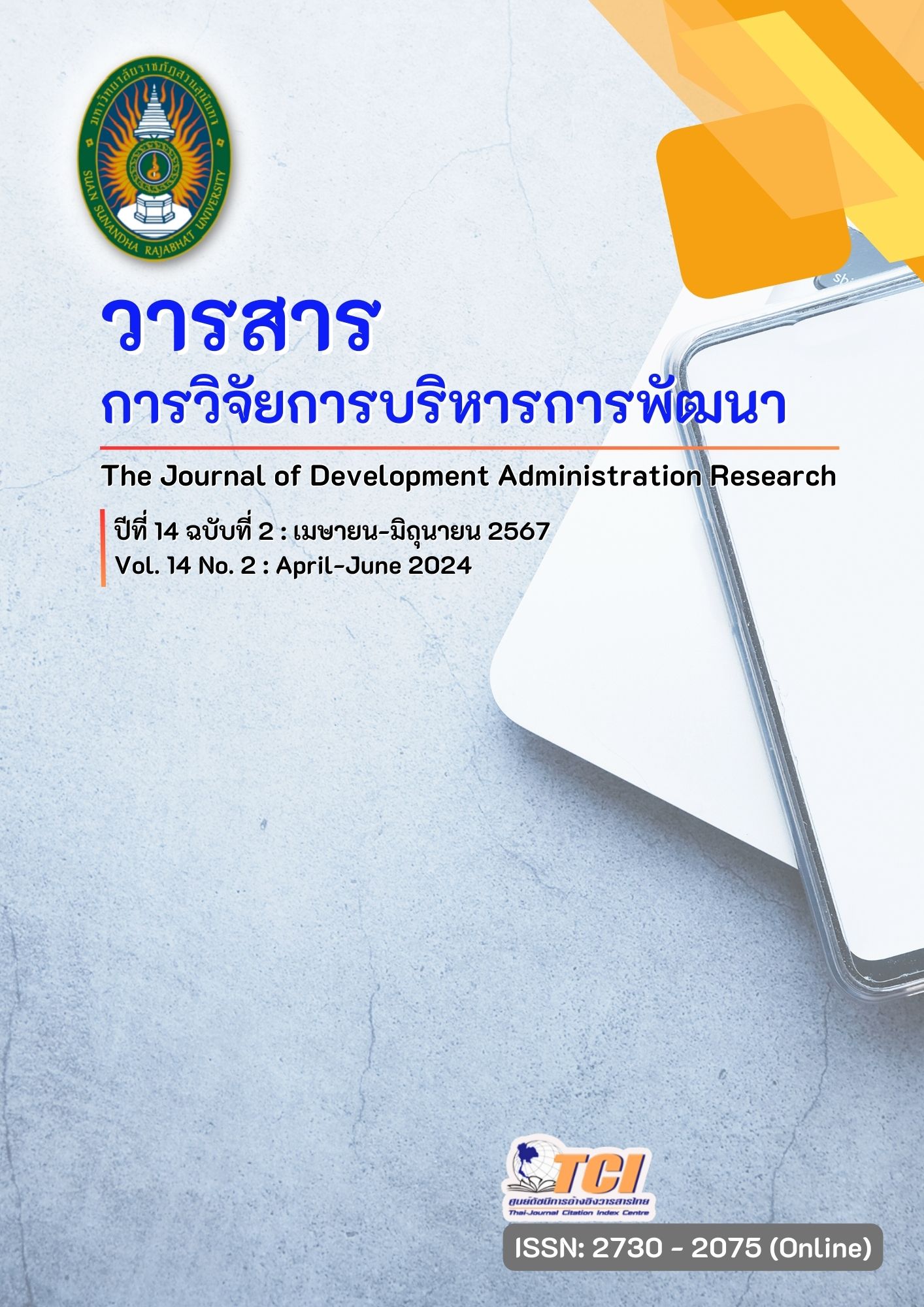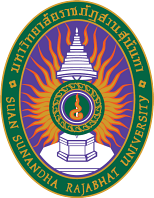ปัจจัยเชิงสาเหตุที่ส่งผลต่อการจัดการความรู้และประสิทธิภาพส่วนบุคคลของธุรกิจก่อสร้างในประเทศไทย
คำสำคัญ:
การจัดการความรู้, ภาวะผู้นำการเปลี่ยนแปลง, วัฒนธรรมองค์การแบบมุ่งสำเร็จ, เทคโนโลยีสารสนเทศ, ประสิทธิภาพส่วนบุคคลบทคัดย่อ
งานวิจัยนี้มีวัตถุประสงค์ 1) เพื่อศึกษาระดับของปัจจัยเชิงสาเหตุที่ส่งผลต่อการจัดการความรู้และประสิทธิภาพส่วนบุคคลของธุรกิจก่อสร้างในประเทศไทย 2) เพื่อศึกษาอิทธิพลที่ส่งผลต่อการจัดการความรู้และประสิทธิภาพส่วนบุคคลของธุรกิจก่อสร้างในประเทศไทย และ 3) เพื่อสร้างแบบจำลองของปัจจัยเชิงสาเหตุที่ส่งผลต่อการจัดการความรู้และประสิทธิภาพส่วนบุคคลของธุรกิจก่อสร้างในประเทศไทย การวิจัย
ครั้งนี้เป็นการวิจัยแบบผสมผสาน ประชากร คือ บุคลากรของธุรกิจก่อสร้างในประเทศไทย โดยใช้เทคนิคสถิติโมเดลสมการโครงสร้างกำหนดขนาดกลุ่มตัวอย่าง 20 เท่าของจำนวนตัวแปรสังเกตได้ ได้กลุ่มตัวอย่างจำนวน 420 คน ใช้การสุ่มแบบหลายขั้นตอนและการสัมภาษณ์เชิงลึก 5 คน จากการสุ่มแบบเจาะจงจากผู้เชี่ยวชาญของธุรกิจก่อสร้าง เครื่องมือที่ใช้เก็บรวบรวมข้อมูลโดยใช้แบบสอบถามและการสัมภาษณ์เชิงลึก การวิเคราะห์ข้อมูลด้วยสถิติเชิงพรรณนา และสถิติโมเดลสมการโครงสร้าง
ผลการวิจัยพบว่า 1) ระดับภาวะผู้นำการเปลี่ยนแปลง, วัฒนธรรมองค์การแบบมุ่งสำเร็จ, เทคโนโลยีสารสนเทศ การจัดการความรู้และประสิทธิภาพส่วนบุคคลโดยรวมอยู่ในระดับมาก 2) ผลการศึกษาอิทธิพล ภาวะผู้นำการเปลี่ยนแปลงมีอิทธิพลทางตรงเชิงบวกต่อการจัดการความรู้และประสิทธิภาพส่วนบุคคล วัฒนธรรมองค์การแบบมุ่งสำเร็จมีอิทธิพลทางตรงเชิงบวกต่อการจัดการและประสิทธิภาพส่วนบุคคล เทคโนโลยีสารสนเทศมีอิทธิพลทางตรงเชิงบวกต่อการจัดการความรู้และประสิทธิภาพส่วนบุคคล การจัดการความรู้มีอิทธิพลทางตรงเชิงบวกต่อประสิทธิภาพส่วนบุคคล 3) ผลการสร้างแบบจำลองของปัจจัยเชิงสาเหตุที่ส่งผลต่อการจัดการความรู้และประสิทธิภาพส่วนบุคคลของธุรกิจก่อสร้างในประเทศไทยมีความสอดคล้องกับข้อมูลเชิงประจักษ์
เอกสารอ้างอิง
กัลยา วานิชย์บัญชา. (2561). สถิติสำหรับงานวิจัย. (พิมพ์ครั้งที่ 12). กรุงเทพฯ: สามลดา.
กรมพัฒนาธุรกิจการค้า.(2565). รายงานประจำปี ข้อมูลนิติบุคคล. ค้นเมื่อ 15 กันยายน 2566, จาก www.dbd.go.th /dbdweb56/news
ชยพล อึงบวรตระกูล. (2563). ความเสี่ยงต่อการบริหารโครงการก่อสร้างอาคารในมุมมองผู้บริหารและควบคุมการก่อสร้าง (วิทยานิพนธ์วิทยาศาสตร์มหาบัณฑิต). มหาวิทยาลัยศิลปากร.
ธนาคารแห่งประเทศไทย. (2565). รายงานแนวโน้มธุรกิจ ไตรมาสที่ 1/2565. ค้นเมื่อ 10 สิงหาคม 2566, จาก https://www.bot.or.th/Thai/MonetaryPolicy/EconomicConditions/BLP
สุชัญญา โปษยะนันทน์ และวสันต์ ธีระเจตกลู. (2556). ปัจจัยหลักในการจัดการองค์ความรู้เชิงปฏิบัติในอุตสาหกรรมก่อสร้างสร้างขนาดกลางและขนาดย่อม. วิศวกรรมสารฉบับวิจัยและพัฒนา, 24(1), 1-8.
สุธรรม สิกขาจารย์, ทัศนีย์ ช่อเทียนทิพย์, วิรัตน์ มณีพฤกษ์, และนำพล ม่วงอวยพร. (2562). การทบทวนแนวคิดการจัดการความรู้ในองค์กร. วารสารวิชาการ การจัดการภาครัฐและเอกชน, 1(1),13-25.
Abbas, M., & Aslan, S. (2018). The effect of knowledge management, organizational culture, and organizational learning on innovation in automotive industry. Journal of Business Economics and Management, 19(1), 1-20.
Abidali, F., & Harris, F. (1995). A methodology for predict company failure in the construction Industry. Construction Management and Economics, 13(3), 189-196.
Adel, Y., Mounir D., & Nessrine O. (2010). Students’ e-skills, organizational change, and Diversity of learning process: Evidence from French universities. Education and Information Technologies, 1(8), 1-36.
Adogbo, K., & Kolo, A. (2017). Assuagement of organizational leadership for knowledge management practice in the Nigerian construction industry. Journal of Construction Project Management and Innovation, 7(1), 1977-1994.
Alolabi, A., Ayupp, K., & Dwaikat, M. (2022). The Effect of Transformational Leadership on Individual Readiness to Change:The Mediating Roles of Work Engagement and Organizational Justice (A Study of UAE Construction Industry). International Journal of Academic Research in Economics and Management, 11(3), 538–570.
Amaka, O., & Oluchi, D. (2017). Effect of Cultural Dimensions on Work-Related Attitudes of Construction Workers in South-South Region of Nigeria. Ogwueleka and Diala /International Journal of Architecture, Engineering and Construction, 6 (1), 33-43.
Choi, L. & Yoo (2003). Information Technology Resource, Knowledge Management Capability, and Competitive Advantage. International Journal of management Information, 36, 1063-1074.
Diamantopoulos, A., & Siguaw, J. (2000). Introducing LISREL. London: Sage Publications.
Hair, J., Black, W., Babin, B., Anderson, R. & Tatham, R. (2006). Multivariate Data Analysis. New York: Macmillan.
Hesham, S. M. (2011). Development of KM model for knowledge management Implementation and application in construction projects. Engineering and Physical Sciences, e thesis, 1(2), 1-294.
Jian, Z. & George, Z., Vaughan, C. (2012). Project Culture in the Chinese Construction Industry: Perceptions of Contractors. Australasian Journal of Construction Economics and Building, 9(2), 1-13.
Jianping, P., Quan, J., & Le, P. (2019). IT Application Maturity, Management Institutional Capability and Process Management Capability. Journal of Organizational and End User Computing, 31(1), 61-85.
Junying, L., Zhipeng, C. Yingbin, F., Srinath, P., & Jie, H. (2020). Impact of culture differences on performance of international construction joint ventures: the moderating role of conflict management. Engineering Construction & Architectural Management,1(2), 1-26.
Kaisa, H., Aino, K., & Paavo, R. (2016). Knowledge sharing and individual work performance: An empirical study of a public sector organization. Journal of Knowledge Management, 20(4), 749-768.
Katun, I., Kherun, A., & Godwin, A. (2015). Impact of Organizational Culture on Knowledge Management Process in Construction. Asian Social Science, 11(9), 1-9.
Keller, K.L. (1993) Conceptualizing, Measuring, and Managing Customer-Based Brand Equity. Journal of Marketing, 57, 1-22.
Kim, H. and Fisher, N. (2001). Knowledge management for small occasional construction industry clients. Association of Researchers in Construction Management, 1(1), 597-605.
Kulomri, B. A. (2017). Asseeement Of Organazational Leadership For Knowledge Management Practice In The NigerianI Construction Industry. Journal of Construction Project Management and Innovation, 7(1), 1977-1994.
Likert, R. (1932). A technique for measurement of attitudes. Archives of Psychology, 3(8), 5-55.
Luong, N., & Tsunemi, W. (2017). The Impact of Project Organizational Culture on the Performance of Construction Projects. Sustainability, 9(5), 2-22.
Malek, A. & Ahmad, A. (2022). Task Performance and Information Technology Usage: The Mediating Role of the IT Department. International Journal of Academic Research in Business and Social Sciences, 12(1), 1-18.
Mohamad, Y. & Hassan, B. (2012). Knowledge Management and Growth Performance in Construction Companies. Social and Behavioral Sciences, 62(24), 128-134.
Mohsen, A.L. (2011). The Relationship between Organizational Culture and Knowledge Management. Procedia Computer Science, 3(1), 1224–1236.
Patricia, C., Chimay J., & John M. (2000). Knowledge Management Stratgy for Construction: key IT and contextual issues. Proceedings of CIT 2000, 28-30.
Sahban, M.A. (2019). The transformational leadership, knowledge management and perceived organizational support in predicting innovation capability. Polish Journal of Management Studies, 20(1), 372-381.
Sajeet P., Lalatendu, K.J, Pratishtha, B. (2018). Transformational Leadership and ContextualPerformance: Role of Integrity among Indian IT Professionals. International Journal of Productivity and Performance Management, 67(2), 1-21.
Suksawang, P. (2014). The Basics of Structural Equation Modeling. Princess of Naradhiwas University Journal, 6(2), 136-145.
Sarajul, M. & Syamsul Z. (2000). Artificial Intelligence Support For Knowledge Management in Construction. The core, 2(1), 1-9.
Sayyadi, M. & Provitera M.J. (2019). The transformational leader's role in organizational design and knowledge management performance. International Leadership Journal, 11(3), 62–82.
ดาวน์โหลด
เผยแพร่แล้ว
รูปแบบการอ้างอิง
ฉบับ
ประเภทบทความ
สัญญาอนุญาต
ลิขสิทธิ์ (c) 2024 วารสารการวิจัยการบริหารการพัฒนา

อนุญาตภายใต้เงื่อนไข Creative Commons Attribution-NonCommercial-NoDerivatives 4.0 International License.
บทความที่ได้รับการตีพิมพ์เป็นลิขสิทธิ์ของมหาวิทยาลัยราชภัฏสวนสุนันทา
ข้อความที่ปรากฏในบทความแต่ละเรื่องในวารสารวิชาการเล่มนี้เป็นความคิดเห็นส่วนตัวของผู้เขียนแต่ละท่านไม่เกี่ยวข้องกับมหาวิทยาลัยราชภัฏสวนสุนันทา และคณาจารย์ท่านอื่นๆ ในมหาวิทยาลัยฯ แต่อย่างใด ความรับผิดชอบองค์ประกอบทั้งหมดของบทความแต่ละเรื่องเป็นของผู้เขียนแต่ละท่าน หากมีความผิดพลาดใดๆ ผู้เขียนแต่ละท่านจะรับผิดชอบบทความของตนเองแต่ผู้เดียว




